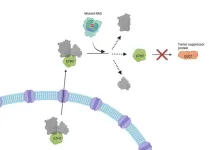(Press-News.org) Research Highlights:
Scientists conducted a simulation study to estimate the impact of cardiovascular-kidney-metabolic (CKM) syndrome on cardiovascular disease (CVD) risk prediction.
The study found that adults with chronic kidney disease would have elevated CVD risk eight years earlier than those without the disease. In addition, people with Type 2 diabetes would have an elevated CVD risk about a decade sooner than those without it.
Among adults with both Type 2 diabetes and chronic kidney disease, women were predicted to reach elevated risk for CVD 26 years earlier and men 28 years earlier than those with neither condition.
Note: The study featured in this news release is a research abstract. Abstracts presented at the American Heart Association’s scientific meetings are not peer-reviewed, and the findings are considered preliminary until published as full manuscripts in a peer-reviewed scientific journal.
Embargoed until 4 a.m. CT/5 a.m. ET, Monday, Nov. 11, 2024
DALLAS, Nov. 11, 2024 — People with chronic kidney disease, Type 2 diabetes or both were predicted to have elevated cardiovascular disease (CVD) risk 8 to 28 years sooner than someone without those conditions, according to a preliminary study to be presented at the American Heart Association’s Scientific Sessions 2024. The meeting, Nov. 16-18, 2024, in Chicago, is a premier global exchange of the latest scientific advancements, research and evidence-based clinical practice updates in cardiovascular science.
Current guidelines on CVD prevention define CVD risk as elevated if the chance of having a heart attack or stroke in the next 10 years is 7.5% or higher. Chronic kidney disease and Type 2 diabetes increase risk and are two of the four components of cardiovascular-kidney-metabolic (CKM) syndrome, which the American Heart Association defines as the interplay of cardiovascular disease, kidney disease and the metabolic disorders Type 2 diabetes and obesity. This study aimed to better understand the effects of (CKM) syndrome on CVD risk.
Researchers created risk profiles to simulate men and women with and without chronic kidney disease and/or Type 2 diabetes at each age from 30 to 79 years. They used the American Heart Association Predicting Risk of cardiovascular disease EVENTs (PREVENT™) calculator to determine at what age someone with each risk profile would be expected to have elevated CVD risk.
The risk profiles were based on data from the National Health and Nutrition Examination Survey 2011-2020. Chronic kidney disease was defined as estimated glomerular filtration rate (eGFR) of 44.5, which indicates stage 3 kidney disease. Type 2 diabetes was indicated as a “yes” response to the PREVENT calculator prompt, “Any history of diabetes.” Profiles without CKM syndrome were derived from average blood pressure, cholesterol and eGFR levels representing survey participants who did not have diabetes, were not taking medicines to lower blood pressure or cholesterol and were non-smokers.
According to the American Heart Association, nearly half of all U.S. adults are living with some form of CVD, and one in three has at least three risk factors that contribute to CKM syndrome. Identifying who is at greatest risk earlier can improve primary prevention and reduce the risk of premature death from CVD.
“Our findings help to interpret the combination of risk factors that will lead to a high predicted CVD risk and at what age they have an impact on risk,” said lead study author Vaishnavi Krishnan, B.S., a researcher at Northwestern University in Chicago and a medical student at Boston University School of Medicine in Boston. “For example, if someone has borderline-elevated levels of blood pressure, glucose and/or impaired kidney function, but they don’t yet have hypertension or diabetes or chronic kidney disease, their risk may not be recognized. Understanding how age interacts with risk factor levels is important to optimize CKM health.”
Without CKM syndrome, the expected age to reach elevated CVD risk was 68 years for women and 63 for men. However, with CKM components added to the simulated patient profile, the same risk level was predicted to occur at a much younger age:
For adults with stage 3 chronic kidney disease, predicted 10-year CVD risk was elevated at age 60 for women and 55 for men. This is 8 years younger than expected for men and women without CKM syndrome.
For adults with Type 2 diabetes, predicted 10-year risk of CVD was elevated at age 59 for women and 52 for men. This is 9 years younger for women and 11 years younger for men compared to those without CKM syndrome.
For adults who had both Type 2 diabetes and stage 3 chronic kidney disease, predicted 10-year risk of CVD was elevated at age 42 for women and 35 for men. This is 26 years younger for women and 28 years younger for men compared to those without CKM syndrome.
“A strength of this study is that it spans nearly the full adult life course and examines how risk factor levels due to CKM conditions of chronic kidney disease and Type 2 diabetes may impact predicted CVD risk,” Krishnan said. “However, a limitation of this study is that these are predicted risk calculations based on a simulated population.”
“This is an early step in the process of understanding how a risk model works,” said Sadiya S. Khan, M.D., M.Sc., co-author of the study, the Magerstadt Professor of Cardiovascular Epidemiology and an associate professor of cardiology, medical social sciences and preventive medicine (epidemiology) at Northwestern School of Medicine in Chicago, and chair of the writing group for the PREVENT equations. “Future work and guidelines are needed to determine how to use the PREVENT equations and what risk thresholds should be used in a clinical setting.”
To address the complex health threat of CKM syndrome, the American Heart Association, celebrating 100 years of lifesaving service as a global force for healthier lives for all, has launched a four-year Cardiovascular-Kidney-Metabolic (CKM) Health Initiative, supported by Novo Nordisk and Boehringer Ingelheim. The initiative will track CKM measures in the Association’s Get With The Guidelines® and outpatient data registries; improve coordination among CVD, kidney and diabetes specialists; and promote best practices, including guideline-directed treatment. This work will help assess gaps in clinical care, identify areas for future research, and implement guidelines and screening recommendations to provide clear and definitive advice for CKM syndrome treatment.
Co-authors, disclosures and funding sources for this study are listed in the abstract.
Statements and conclusions of studies that are presented at the American Heart Association’s scientific meetings are solely those of the study authors and do not necessarily reflect the Association’s policy or position. The Association makes no representation or guarantee as to their accuracy or reliability. Abstracts presented at the Association’s scientific meetings are not peer-reviewed, rather, they are curated by independent review panels and are considered based on the potential to add to the diversity of scientific issues and views discussed at the meeting. The findings are considered preliminary until published as a full manuscript in a peer-reviewed scientific journal.
The Association receives funding primarily from individuals; foundations and corporations (including pharmaceutical, device manufacturers and other companies) also make donations and fund specific Association programs and events. The Association has strict policies to prevent these relationships from influencing the science content. Revenues from pharmaceutical and biotech companies, device manufacturers and health insurance providers and the Association’s overall financial information are available here.
Additional Resources:
Multimedia is available on the right column of the release link https://newsroom.heart.org/news/heart-disease-could-hit-up-to-28-years-sooner-for-people-with-ckm-syndrome?preview=d20eca7d1b082ff0a41253140f14ec0b
Spanish news release
Link to abstract MDP1230; and AHA Scientific Sessions 2024 Online Program Planner
AHA news release: Heart disease risk, prevention and management redefined (Oct. 2023)
AHA health information: Cardiovascular-Kidney-Metabolic Health
For more news at AHA Scientific Sessions 2024, follow us on X @HeartNews, #AHA24
###
About the American Heart Association
The American Heart Association is a relentless force for a world of longer, healthier lives. We are dedicated to ensuring equitable health in all communities. Through collaboration with numerous organizations, and powered by millions of volunteers, we fund innovative research, advocate for the public’s health and share lifesaving resources. The Dallas-based organization has been a leading source of health information for a century. During 2024 - our Centennial year - we celebrate our rich 100-year history and accomplishments. As we forge ahead into our second century of bold discovery and impact, our vision is to advance health and hope for everyone, everywhere. Connect with us on heart.org, Facebook, X or by calling 1-800-AHA-USA1.
END
Heart disease could hit up to 28 years sooner for people with CKM syndrome
American Heart Association Scientific Sessions 2024, Abstract MDP1576
2024-11-11
ELSE PRESS RELEASES FROM THIS DATE:
MESA heart disease risk score worked well with or without race included
2024-11-11
Research Highlights:
A version of the Multi-Ethnic Study of Atherosclerosis (MESA) heart disease risk score that did not include race predicted heart disease risk just as well as the original version that includes race.
The original MESA risk score, developed in 2015[1], combines traditional risk factors, sex and race with a coronary artery calcium score.
The MESA formula without race may be used for people who identify with more than one racial or ethnic group or those who prefer not to disclose their race or ethnicity.
Note: The study featured in this ...
Bystander CPR up to 10 minutes after cardiac arrest may protect brain function
2024-11-11
This news release contains updated information and data not included in the abstract.
Research Highlights:
The sooner a lay rescuer (bystander) starts cardiopulmonary resuscitation (CPR) on a person having a cardiac arrest at home or in public, up to 10 minutes after the arrest, the better the chances of survival and brain protection, according to an analysis of nearly 200,000 out-of-hospital cardiac arrest cases in the U.S. from 2013 to 2022.
Among the study’s findings, people who received CPR within two minutes of out-of-hospital cardiac arrest had 81% higher odds of survival to release from the hospital ...
911 dispatcher assistance improved chances of receiving bystander CPR
2024-11-11
Research Highlights:
A study of nearly 2,400 cardiac arrest cases in North Carolina found that when emergency dispatchers (telecommunicators) provided cardiopulmonary resuscitation (CPR) instructions to 911 callers, people were more likely to provide aid for both men and women.
The study’s findings indicate that when a telecommunicator provided assistance to callers, bystander CPR was performed 44% of the time on women and 40% on men, compared to 9% on women and 11% on men when telecommunicator assistance was not provided.
Researchers found the telecommunicator role critical in instructing bystanders to act quickly, possibly instrumental in reducing sex disparities ...
GLP-1, SGLT2 medications may lower stroke survivor’s risk of future heart attack, stroke
2024-11-11
Research Highlights:
In an analysis of more than 7,000 stroke survivors, those who were taking either a GLP1-receptor agonist or an SGLT2 inhibitor medication had a lower risk of a subsequent stroke, heart attack or death compared to peers who were not prescribed the medications during a three-year follow up period.
The analysis used health data from the Rochester Epidemiology Project collected from 2000 to 2022. The first GLP-1 medication was prescribed beginning in 2006, and the authors included cases beginning in 2000 to increase the power of the study, they noted.
Note: The study featured in this news release ...
TYK2 transforms tau from ‘good guy’ to a ‘bad guy’ that contributes to Alzheimer’s disease
2024-11-11
Researchers at Baylor College of Medicine, the Jan and Dan Duncan Neurological Research Institute (Duncan NRI) at Texas Children’s Hospital and collaborating institutions discovered that the enzyme TYK2 transforms the normal protein tau into one that accumulates in the brain and contributes to the development of Alzheimer’s disease in animal models. Published in Nature Neuroscience, the study suggests that partially restraining TYK2 could be a strategy to reduce tau levels and toxicity.
“Many studies have shown that the accumulation ...
Elephant seal colony declines one year after avian flu outbreak
2024-11-11
The sounds of barking elephant seals are again in the air along the breeding grounds of Península Valdés, Argentina—but it’s quieter. Almost exactly a year after a massive outbreak of H5N1 highly pathogenic avian influenza killed more than 17,000 elephant seals, including about 97% of their pups, scientists estimate that only about a third of the elephant seals normally expected here returned.
“It’s beautiful to walk the beaches now and hear elephant seals again,” said Marcela Uhart, director of the Latin America Program at the UC Davis Karen C. Drayer Wildlife Health Center within ...
While more is better, even moderate amounts of exercise may reduce risk for common heart condition
2024-11-11
Adding an extra hour every week of physical activity may lower the chance of developing the most common type of irregular heartbeat (arrythmia) by 11%, a new study shows.
Led by researchers at NYU Langone Health, the investigation focused on atrial fibrillation, a condition in which the heart’s upper two chambers beat rapidly and irregularly instead of at a consistent pace. If left untreated, this can lead to stroke, heart failure, and other issues. While past studies have linked exercise to reduced risk of this type of arrhythmia, nearly all of these analyses have relied on the participants’ ...
Researchers uncover new role of mutant proteins in some of the deadliest cancers
2024-11-11
Researchers at the National Institutes of Health (NIH) and their collaborators have discovered a new way in which RAS genes, which are commonly mutated in cancer, may drive tumor growth beyond their well-known role in signaling at the cell surface. Mutant RAS, they found, helps to kick off a series of events involving the transport of specific nuclear proteins that lead to uncontrolled tumor growth, according to a study published November 11, 2024, in Nature Cancer.
RAS genes are the second most frequently mutated genes in cancer, and mutant RAS proteins are key drivers of some of the deadliest cancers, ...
Patients may become unnecessarily depressed by common heart medicine
2024-11-11
All patients who have had a heart attack are typically treated using beta blockers. According to a Swedish study conducted earlier this year, this drug is unlikely to be needed for those heart patients who have a normal pumping ability. Now a sub-study at Uppsala University shows that there is also a risk that these patients will become depressed by the treatment.
“We found that beta blockers led to slightly higher levels of depression symptoms in patients who had had a heart attack but were not suffering from heart failure. At the same time, beta blockers have no life-sustaining function for this group of patients,” says Philip Leissner, a doctoral student in cardiac ...
Largest T cell clinical trial in solid tumors heralds new era in precision immunotherapy
2024-11-11
The largest ever clinical trial of T cell therapy (a type of cell-based immunotherapy) for solid tumours has been completed.
Led by a Singapore clinician-investigator, the global, international, multisite trial recruited 330 advanced nasopharyngeal (NPC) cancer patients in 23 sites across Singapore, Malaysia, Thailand, Taiwan and the United States.
The trial did not show an overall survival benefit for the entire patient cohort but a subset analysis combining outcomes of US, Singapore and Taiwanese sites, showed better progression free survival ...
LAST 30 PRESS RELEASES:
Roadmap for Europe’s biodiversity monitoring system
Novel camel antimicrobial peptides show promise against drug-resistant bacteria
Scientists discover why we know when to stop scratching an itch
A hidden reason inner ear cells die – and what it means for preventing hearing loss
Researchers discover how tuberculosis bacteria use a “stealth” mechanism to evade the immune system
New microscopy technique lets scientists see cells in unprecedented detail and color
Sometimes less is more: Scientists rethink how to pack medicine into tiny delivery capsules
Scientists build low-cost microscope to study living cells in zero gravity
The Biophysical Journal names Denis V. Titov the 2025 Paper of the Year-Early Career Investigator awardee
Scientists show how your body senses cold—and why menthol feels cool
Scientists deliver new molecule for getting DNA into cells
Study reveals insights about brain regions linked to OCD, informing potential treatments
Does ocean saltiness influence El Niño?
2026 Young Investigators: ONR celebrates new talent tackling warfighter challenges
Genetics help explain who gets the ‘telltale tingle’ from music, art and literature
Many Americans misunderstand medical aid in dying laws
Researchers publish landmark infectious disease study in ‘Science’
New NSF award supports innovative role-playing game approach to strengthening research security in academia
Kumar named to ACMA Emerging Leaders Program for 2026
AI language models could transform aquatic environmental risk assessment
New isotope tools reveal hidden pathways reshaping the global nitrogen cycle
Study reveals how antibiotic structure controls removal from water using biochar
Why chronic pain lasts longer in women: Immune cells offer clues
Toxic exposure creates epigenetic disease risk over 20 generations
More time spent on social media linked to steroid use intentions among boys and men
New study suggests a “kick it while it’s down” approach to cancer treatment could improve cure rates
Milken Institute, Ann Theodore Foundation launch new grant to support clinical trial for potential sarcoidosis treatment
New strategies boost effectiveness of CAR-NK therapy against cancer
Study: Adolescent cannabis use linked to doubling risk of psychotic and bipolar disorders
Invisible harms: drug-related deaths spike after hurricanes and tropical storms
[Press-News.org] Heart disease could hit up to 28 years sooner for people with CKM syndromeAmerican Heart Association Scientific Sessions 2024, Abstract MDP1576


